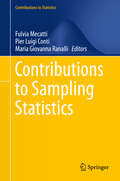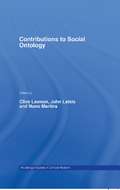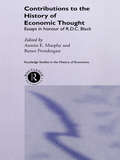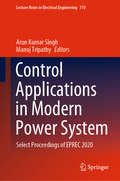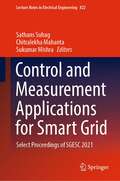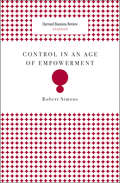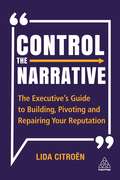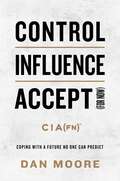- Table View
- List View
Contributions to Sampling Statistics (Contributions to Statistics)
by Fulvia Mecatti Pier Luigi Conti Maria Giovanna RanalliThis book contains a selection of the papers presented at the ITACOSM 2013 Conference, held in Milan in June 2013 It is intended as an international forum of scientific discussion on the developments of theory and application of survey sampling methodologies and applications in human and natural sciences. The book gathers research papers carefully selected from both invited and contributed sessions of the conference. The whole book appears to be a relevant contribution to various key aspects of sampling methodology and techniques; it deals with some hot topics in sampling theory, such as calibration, quantile-regression and multiple frame surveys and with innovative methodologies in important topics of both sampling theory and applications Contributions cut across current sampling methodologies such as interval estimation for complex samples, randomized responses, bootstrap, weighting, modeling, imputation, small area estimation and effective use of auxiliary information; applications cover a wide and enlarging range of subjects in official household surveys, Bayesian networks, auditing, business and economic surveys, geostatistics and agricultural statistics. The book is an updated, high level reference survey addressed to researchers, professionals and practitioners in many fields.
Contributions to Social Ontology (Routledge Studies in Critical Realism)
by Clive Lawson John Latsis Nuno MartinsRecent years have seen a dramatic re-emergence of interest in ontology. From philosophy and social sciences to artificial intelligence and computer science, ontology is gaining interdisciplinary influence as a popular tool for applied research. Contributions to Social Ontology focuses specifically on these developments within the social sciences. The contributions reveal that this revived interest in social ontology involves far more than an unquestioning acceptance or application of the concepts and methods of academic philosophers. Instead as ontology permeates so many new areas, social ontology itself is evolving in new and fascinating ways. This book engages with these new developments, pushing it forward with cutting-edge new material from leading authors in this area, from Roy Bhaskar to Margaret Archer. It also explicitly analyzes the relationship between the new ontological projects and the more traditional approaches. This book will be of great interest to students and researchers alike across the social sciences and particularly in philosophy, economics and sociology.
Contributions to the History of Economic Thought: Essays in Honour of R.D.C. Black (Routledge Studies In The History Of Economics Ser.)
by Renee Prendergast Antoin E. MurphyFeaturing original contributions from some of the leading contemporary figures in the history of economic thought, this book offers new perspectives on key topics, from Smith's Wealth of Nations to the Jevonian Revolution. Drawing inspiration from the life and work of R.D.C. Black, formerly Professor of Economics at Queen's University Belfast, this
Control Applications in Modern Power System: Select Proceedings of EPREC 2020 (Lecture Notes in Electrical Engineering #710)
by Arun Kumar Singh Manoj TripathyThis book presents select proceedings of the Electric Power and Renewable Energy Conference 2020 (EPREC 2020). This book provides rigorous discussions, case studies, and recent developments in emerging areas of control systems, especially, load frequency control, wide-area monitoring, control & instrumentation, optimization, intelligent control, energy management system, SCADA systems, etc. The contents of this book will be useful to researchers and professionals interested in control theory and its applications to power grids and systems. The book can also be used by policy makers and power engineers involved in power generation and distribution.
Control Applications in Modern Power Systems: Select Proceedings of EPREC 2021 (Lecture Notes in Electrical Engineering #870)
by Jitendra Kumar Manoj Tripathy Premalata JenaThe volume contains peer-reviewed proceedings of EPREC 2021 with a focus on control applications in the modern power system. The book includes original research and case studies that present recent developments in the control system, especially load frequency control, wide-area monitoring, control & instrumentation, optimization, intelligent control, energy management system, SCADA systems, etc. The book will be a valuable reference guide for beginners, researchers, and professionals interested in advancements in the control system.
Control Applications in Modern Power Systems: Select Proceedings of EPREC 2022 (Lecture Notes in Electrical Engineering #974)
by Jitendra Kumar Manoj Tripathy Premalata JenaThis book provides rigorous discussions, case studies, and recent developments in the emerging areas of a control system, especially load frequency control, wide-area monitoring, control and instrumentation, optimization, intelligent control, energy management system, SCADA systems, etc. The readers would be benefitted from enhancing their knowledge and skills in the domain areas. Also, this book may help the readers in developing new and innovative ideas. The book can be a valuable reference for researchers and professionals interested in developments in the control system.
Control Applications in Modern Power Systems: Select Proceedings of EPREC 2023, Volume 3 (Lecture Notes in Electrical Engineering #1128)
by Shailendra Kumar Manoj Tripathy Premalata JenaThis book entitled “Control Applications in Modern Power System - Select Proceedings of EPREC-2023 provides rigorous discussions, case studies, and recent developments in the emerging areas of control systems, especially, load frequency control, wide-area monitoring, control & instrumentation, optimization, intelligent control, energy management system, SCADA systems, design of control strategies is essential for controlling the reactive power and maintains the voltage profiles, etc. The readers would benefit from enhancing their knowledge and skills in the domain areas. Also, this book may help the readers in developing new and innovative ideas. The book can be a valuable reference for beginners, researchers, and professionals interested in developments in control systems.
Control Applications in Modern Power Systems: Select Proceedings of EPREC 2024, Volume 3 (Lecture Notes in Electrical Engineering #1304)
by Om P. Malik Vijay K. Sood Manoj Tripathy Arvind Kumar Prajapati Asheesh K. SinghThe book titled "Control Applications in Modern Power System - select proceedings of EPREC-2024" delves into in-depth discussions, case studies, and recent advancements within the burgeoning field of control systems. It specifically focuses on areas such as load frequency control, wide-area monitoring, control and instrumentation, optimization, intelligent control, energy management systems, and SCADA systems. The development of effective control strategies plays a pivotal role in managing reactive power and upholding voltage profiles, among other critical aspects. Readers stand to gain valuable insights, bolstering their knowledge and expertise in these domains. Furthermore, this book has the potential to inspire fresh and innovative ideas. Whether a newcomer, a researcher, or a seasoned professional, this book serves as an invaluable reference for all for staying abreast of the latest developments in control systems.
Control Data Corporation and the Urban Crisis
by Tom NicholasControl Data Corporation is considering its response to the assassination of renowned civil rights activist Martin Luther King. Four months prior, William Norris, president of the Minneapolis-based computer firm had already committed to building a plant in a low-income area of Minneapolis, but with pressure rising on businesses to respond to inner-city needs and increase minority hiring, Norris urges the company to consider building yet another inner-city plant, this time in Washington, D.C.
Control Levers in Action: Controlling Business Strategy
by Robert L. SimonsProviding insight into how control systems influence behaviors and drive strategic renewal, this chapter describes the results of a study of 10 newly appointed managers and their use of the four control levers.
Control Systems and Mathematical Methods in Economics: Essays in Honor of Vladimir M. Veliov (Lecture Notes in Economics and Mathematical Systems #687)
by Gernot Tragler Raimund M. Kovacevic Gustav FeichtingerSince the days of Lev Pontryagin and his associates, the discipline of Optimal Control has enjoyed a tremendous upswing – not only in terms of its mathematical foundations, but also with regard to numerous fields of application, which have given rise to highly active research areas. Few scholars, however, have been able to make contributions to both the mathematical developments and the (socio-)economic applications; Vladimir Veliov is one of them. In the course of his scientific career, he has contributed highly influential research on mathematical aspects of Optimal Control Theory, as well as applications in Economics and Operations Research. One of the hallmarks of his research is its impressive breadth. This volume, published on the occasion of his 65th birthday, accurately reflects that diversity. The mathematical aspects covered include stability theory for difference inclusions, metric regularity, generalized duality theory, the Bolza problem from a functional analytic perspective, and fractional calculus. In turn, the book explores various applications of control theory, such as population dynamics, population economics, epidemiology, optimal growth theory, resource and energy economics, environmental management, and climate change. Further topics include optimal liquidity, dynamics of the firm, and wealth inequality.
Control Tomorrow's Costs Through Today's Designs
by Robin Cooper W. Bruce ChewIn the past, companies took a cost-plus approach to pricing, charging high prices when a product was first released, then lowering prices when production was scaled up. Lean competitors make that approach impossible, however, as they are quick to introduce competitive "me too" products to market. To gain and hold market leadership today, a company must design the cost out of its products from the outset. Target costing is a cost-management technique that lets a company do just that: The company determines how much customers are willing to pay for a product and then designs the product within cost limits that will permit it to sell profitably at the predetermined price.
Control and Measurement Applications for Smart Grid: Select Proceedings of SGESC 2021 (Lecture Notes in Electrical Engineering #822)
by Sukumar Mishra Sathans Suhag Chitralekha MahantaThe book contains select proceedings of the International Conference on Smart Grid Energy Systems and Control (SGESC 2021). The proceedings is divided into 03 volumes, and this volume focuses on adaptive control and intelligent sensors, wide-area measurements, and applications in the smart grid. This book includes papers on topics such as SMART sensors, vision sensors, sensor fusion, wireless sensors, and the internet of things, MEMS, Mechatronics, Remote sensing, telemetry, and its applications in automated vehicle control. This book is a unique collection of chapters from different areas with a common theme and will be immensely useful to academic researchers and practitioners in the industry.
Control in an Age of Empowerment
by Robert L. SimonsA problem facing managers in the 1990s is how to exercise adequate control in organizations that demand flexibility, innovation, and creativity. How do senior managers protect their companies from control failures when employees are encouraged to redefine how they do their jobs? Today's managers must permit employees to initiate process improvements and new ways of responding to customers' needs--but in a controlled way. Fortunately, the tools to reconcile the conflict between creativity and control are at hand: Belief systems communicate core values and inspire all participants to commit to the organization's purpose. Boundary systems establish rules and identify pitfalls. Diagnostic control systems allow managers to ensure that employees are meeting goals efficiently and effectively. And interactive control systems enable top-level managers to focus on strategic uncertainties.
Control in an Age of Empowerment (Harvard Business Review Classics)
by Robert SimonsRobert Simons explains how to give employees the freedom to innovate while protecting your firm from loose cannons. Using powerful examples, Simons shows how to apply four powerful management 'levers' to balance autonomy with control.
Control of Operation Modes of Gas Consumers in the Event of Gas Supply Disruptions
by Viktor I. Rabchuk Sergey M. Senderov Sergey V. VorobevThis book is focused on the management of gas consumers, especially in cases of gas supply disruptions. It addresses natural gas consumers from numerous different fields, including those in the industrial sector, the electric power industry, and public utilities.It highlights various ways gas supply can be affected and demonstrates the approaches that can help recovery from reduced, stopped, and restored gas deliveries. The algorithms involved in transitioning gas consumers from normal to emergency operation, and the algorithm for recovering normal operation after an emergency in the gas supply system is terminated are explored thoroughly.By clearly explaining several approaches, this book will enable specialists to more effectively manage gas-consuming enterprises in emergency situations associated with gas supply disruption
Control of Overhead Power Lines with Unmanned Aerial Vehicles (Studies in Systems, Decision and Control #359)
by Artur O. Zaporozhets Yevgen I. SokolThis book is devoted to the development of complex methods and means of their implementation with using UAVs aimed for improving the safety and efficiency of the energy system. The scientific problem of complex automated monitoring of the energy system objects with using UAVs has been solved, including the control of its elements in the visible and infrared range, the acoustic spectrum, as well as by the levels of the electric field strength. The scientific foundations of mathematical, physical and statistical modeling of electromagnetic and acoustic fields in the elements of electric power objects of complex spatial configurations have been created, taking into account the possibility of the appearance of such nonlinear processes as corona discharges and breakdowns at long air gaps. Improved methods are proposed for determining the exact location of accidents on power lines using UAVs on the basis of the developed mathematical models and the obtained analytical expressions. Conceptual foundations for the creation of methods and means for monitoring the state of insulation, lightning protection systems and the integrity of the structures of electric power facilities with using UAVs have been formed.
Control or Flexibility? Structured Empowerment Offers Both - Lessons from Retail & Service Chains
by Tatiana SandinoThis note explains how several retail and service organizations use a practice described here as "structured empowerment" to balance control and flexibility as they grow. I define structured empowerment as a practice that grants employees both (a) the power to make choices from narrow sets of options on a set of inputs and processes and (b) the responsibility to deliver results according to the company's value proposition. This lets a company control operations-by standardizing the options frontline employees can choose from to drive results-and adapt to diverse markets-because combining choices from the options makes a large number of service offerings and routine sequences possible.
Control or Flexibility? Structured Empowerment Offers Both: Lessons from Retail & Service Chains
by Tatiana SandinoThis note explains how several retail and service organizations use a practice described here as "structured empowerment" to balance control and flexibility as they grow. I define structured empowerment as a practice that grants employees both (a) the power to make choices from narrow sets of options on a set of inputs and processes and (b) the responsibility to deliver results according to the company's value proposition. This lets a company control operations-by standardizing the options frontline employees can choose from to drive results-and adapt to diverse markets-because combining choices from the options makes a large number of service offerings and routine sequences possible. This abridged version of the note does not reference the case "OXXO's Turf War Against Extra." It is intended to be used in a classroom setting where "OXXO's Turf War Against Extra" is also being taught, abridged so that it does not give away any relevant information about the case.
Control or Flexibility? Structured Empowerment Offers Both: Lessons from Retail & Service Chains (Abridged)
by Tatiana SandinoIndustry and Background Note
Control the Narrative: The Executive's Guide to Building, Pivoting and Repairing Your Reputation
by Lida CitroënEveryone has a personal brand, by design or default. Your reputation is one of the most critical determinants of your career success. Control the Narrative makes your reputation work for you by using the power of personal branding to put you in control of the opportunities you attract. For professionals seeking to grow, change or fix their careers, the book shows you how to capitalize on the reputation assets that are relevant to your goals and shed the ones that no longer serve you. If you have made a career mistake and need help repairing your reputation, you'll discover how to assess the situation, break the crisis down into a series of actionable responses and re-establish career viability.To be effective, a personal brand must be authentic. Through the process of personal branding, Control the Narrative helps you uncover the core values that form the foundation of your strategy for building, pivoting or repairing your reputation. This book also shows you how to measure the success of your brand and provides suggestions for modifying your strategy when results aren't what you expected. Filled with real life examples, Control the Narrative provides you with the strategic advice and tactical assets to consistently and confidently create a positive reputation.
Control with Fairness in Transfer Pricing
by Robert G. EcclesInterviews with nearly 150 executives in 13 companies show that transfer pricing schemes are a means of generating information and control for implementing corporate, business unit, and product strategy. A company's transfer pricing policy, which includes whether to source inside or out, and the way it is administered depend on the situation and the direction of the organization. Companies can be categorized into four "pure" types: competitive, cooperative, collaborative, and collective. Each type has its own set of problems and characteristics. Problems common to all types include performance problems, interpersonal disputes, power imbalances, demand fluctuations, and product pricing. Regardless of the approach used to set the transfer price, unit managers will agree to it if they feel that top management is treating them fairly.
Control, Influence, Accept (For Now): Coping with a Future No One Can Predict
by Dan MoorePrepare for the future from the inside out.How keen is your self-knowledge? Who influences your understanding of others? When was the last time you really concentrated on your purpose, your resilience, your perspective? And what in the world is polvo? In Control, Influence, Accept(FN), author Dan Moore guides you on an antic journey of self-reflection with a very serious goal: to help you cultivate your inner-self who will be ready for whatever the universe throws at you—the obvious and the odious. From his days selling books door-to-door in the Arizona desert to trying Portuguese delicacies under the watchful eyes of his would-be in-laws, Moore has lived a life just on the edge of the ordinary . . . and he has extracted extraordinary insights from every colorful experience. In hilarious, everyman language, Moore describes his own inflection points and shows you how personal growth will help you get through when getting out simply isn&’t an option. In a world where the only constant is change, Dan Moore thinks you owe it to yourself to set positive patterns for the one and only asset you can actually control—you. No one knows what the future holds. Your best preparation is in the self you bring along.
Control: How the Sense of Mastery, Vulnerability, and Well-Being Affects Consumer Thinking
by Gerald Zaltman Lindsay ZaltmanAcquiring mastery over matters that affect us is a powerful motivation, and the extent to which we do or do not have that mastery greatly affects our sense of well-being. This chapter looks at control as a powerful lens through which consumers view the world.
Controle nemen over je Personal Brand op LinkedIn
by Richard G Lowe Jr Raf SwiggersHoe u uw inkomenpotentieel verhoogt door uzelf op LinkedIn te promoten Leer wat je moet doen om een geweldig personal brand en LinkedIn profiel aan te maken. Een goed profiel zal leiden tot meer leads en aanbiedingen en mogelijk hoger inkomen. Als u uw LinkedIn-profiel laat hoe het is, hoe uitzonderlijk u ook bent, zult u nog steeds vastzitten in dezelfde saaie, onvervullende baan of dagelijks worstelen om leads te krijgen voor uw bedrijf binnen vijf jaar? Ben je gelukkig in de zelfde onbevredigende, onderbetaalde baan dag na dag, of wanhopig en meestal niet succesvol in het zoeken naar mensen die geïnteresseerd zijn in je producten en diensten? Of wilt u liever werkgelegenheid hebben en zakelijke leads die naar u komen, aanbieden om u in dienst te nemen of u geld te betalen, door te leren om uw eigen LinkedIn profiel te schrijven dat de juiste mensen rechtstreeks naar uw inbox trekt? Richard Lowe Jr, Senior Branding Expert, legt persoonlijke branding uit en hoe het u helpt om u als expert in uw gebied te vestigen. Dit leidt tot meer leads, meer aanbiedingen en mogelijk hoger inkomen. Laat niet nog een dag voorbijgaan zonder maatregelen te nemen om uw probleem op te lossen. Haal nu je kopie. Ga naar boven en klik op de knop KOOP NU!
